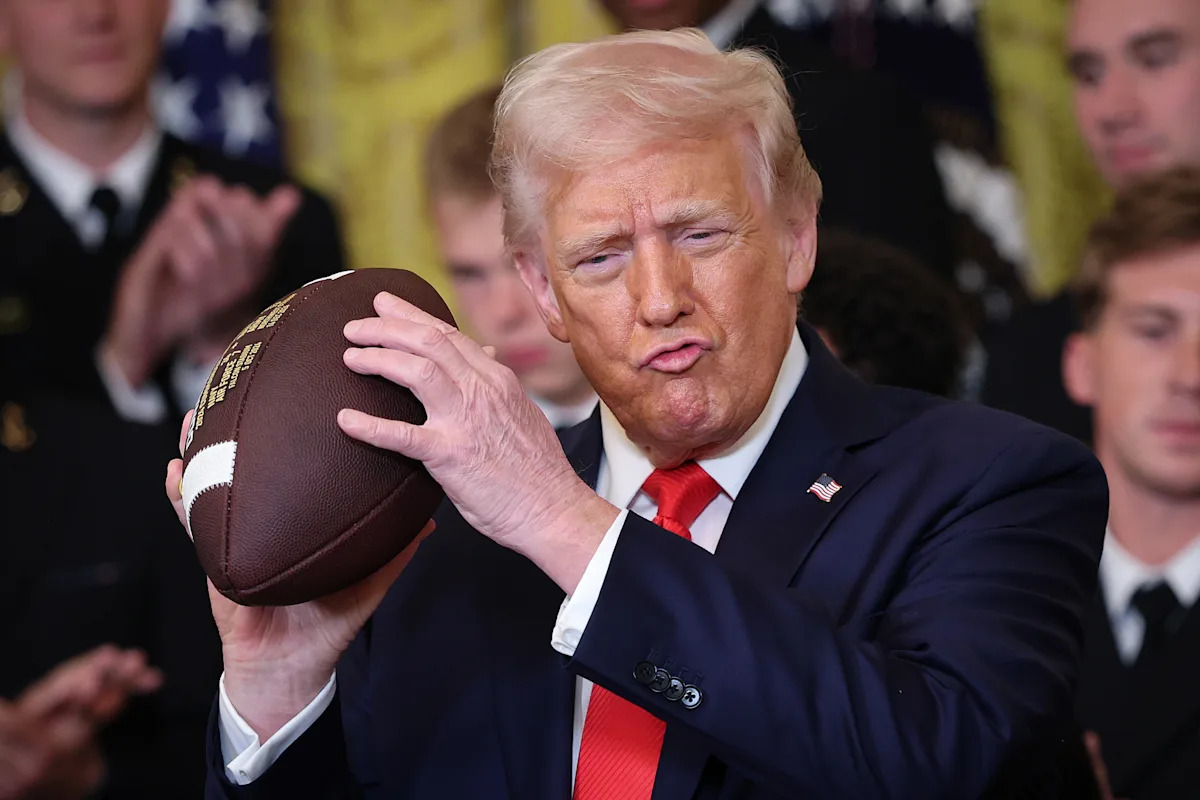ORLANDO, Fla. — If you thought Donald Trump’s boldest promise was ending the war in Ukraine “on Day One” of his presidency, wait until you hear his latest miracle cure:
Our commander-in-chief actually thinks he can fix college football.
Advertisement
Cue the laugh track because that’s almost as funny as him promising to build a wall between the Big Ten and SEC.
Just in case you missed it, Trump signed an executive order last week aimed at “restoring sanity” and claiming that he is “saving college sports” in this era of eight-figure name, image and likeness (NIL) deals, the revolving-door transfer portal and a new nebulous revenue-sharing plan.
Trump’s order directs the Secretary of Labor and the National Labor Relations Board to determine whether college athletes should be considered employees. He also wants the Department of Justice and the Federal Trade Commission to help enforce the “amateur model” of college sports. He is also prohibiting booster-funded third-party, pay-for-play payments to collegiate athletes.
In related news, the president will soon appoint Johnny Manziel as the Secretary of Amateurism.
Advertisement
While I commend the POTUS for making an effort to clean up the sport, there’s a small problem:
It’s impossible for an executive order to fix college football.
Despite the bold language in the order, the actual power of Trump’s EO amounts to little more than a strong suggestion. An executive order, no matter how fiery the rhetoric or noble the intent, applies only to federal bodies. It can’t compel state schools, state politicians, private universities and athletic conferences. And, most importantly, executive orders can easily be overturned by the court system.
And don’t kid yourself. Right now, the courts are the ones truly shaping the future of college athletics, not the NCAA, nor the White House.
Advertisement
The transformation of college football into a billion-dollar, booster-driven bazaar didn’t happen because the NCAA woke up one morning and decided to hand athletes the keys to the vault. It happened because the judicial system forced their hand.
In 2021, the Supreme Court delivered a unanimous 9-0 ruling in NCAA v. Alston, undercutting the organization’s ability to limit education-related benefits and paving the way for athletes to start getting paid. That same summer, after pom-pom waving politicians in several states began passing their own NIL laws, the NCAA effectively threw up its hands and said, “Fine, do what you want.”
The legal dominoes haven’t stopped falling. Now, athletes are not only cashing in on NIL deals, but thanks to the House settlement, schools themselves will be paying players directly – up to $20.5 million annually, per institution. That money shifts college sports even further away from purity and closer to payola. Like it or not, college football is already a professional sport, minus the accountability.
Trump’s executive order, then, enters this conversation not as a reform tool but as a political news release dressed in legalese. It’s a futile attempt to impose some modern-day “common sense” on a historically nonsensical system.
Advertisement
Trump’s desire to “stop the madness” of wealthy boosters bidding for top recruits sounds reasonable, but it reveals a fundamental misunderstanding of what NIL has become — and who’s really in charge.
The recently formed College Sports Commission (CSC), created to police third-party NIL deals and enforce the terms of the House settlement, already backed off from one of its first major mandates — a broad ban on booster-funded NIL collectives paying players directly. Less than three weeks after releasing that edict, they issued a new memo effectively punting on enforcement.
Their revised stance? Collectives can keep operating as long as they can show that each NIL deal serves a “valid business purpose” and is designed to turn a profit. But what qualifies as “valid”? How do you measure “effort to profit”? That’s anyone’s guess. For now, the CSC — a startup with just three employees and a backlog of high-dollar pay-for-play contracts — doesn’t have the manpower to police a system with more loopholes than a congressional ethics policy.
Even UCF athletic director Terry Mohajir, who told me a couple of months ago that he believed the CSC would do its best to regulate collective-driven NIL deals, must be having second thoughts. Within weeks of launching, the enforcement agency has already raised the white flag.
Advertisement
Trump’s executive order is essentially the president arriving at a demolition site with a dustpan and a whisk broom. Good luck, Mr. President, trying to get Congress to back your mandate. Multiple bills aimed at regulating NIL and college sports have already stalled out. Some states are even passing laws insulating their universities from being punished for breaking the pay-for-play rules.
In short, the executive order is essentially a political gesture. It creates the illusion of control, without actually exerting any. The president can’t make the courts rule differently. He can’t stop players from transferring. He can’t keep states like Texas or Georgia from enacting booster-friendly NIL laws. And he certainly can’t keep a five-star recruit from taking a seven-figure deal to switch schools.
Implementing an executive order to fix college football is like trying to stop a tornado with a “No Trespassing” sign. If the president truly wants to be college football’s commissioner–in–chief, he needs to start with one of those bunker-busting bombs he used to devastate Iran’s nuclear infrastructure. The only real solution is to nuke the whole thing and start over from scratch.
The NCAA is a weakened bureaucracy, desperately begging Congress for help. The Power Four conferences are essentially unregulated sports leagues with their own media empires. Athletes are empowered, litigious and emboldened by recent court victories. Boosters are running payroll disguised as marketing agencies.
Advertisement
The fantasy that a single order from the Oval Office could sort all of this out is, quite frankly, hilarious.
With all due respect, Mr. Trump, college football doesn’t need a president.
It needs an exorcist.
____

